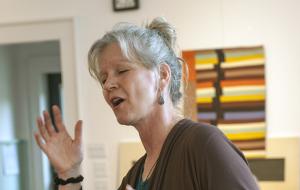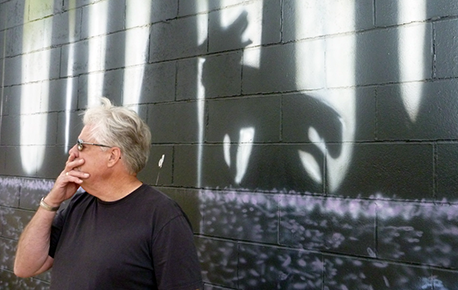The Importance of Writing in a Visual World
Writing, says G.V. Loewen, is arguably the greatest gift bequeathed to us by our own history. His program, Writing and Thinking for The Human Spirit , is at The Haven May 17–19.
Writing, says G.V. Loewen, is arguably the greatest gift bequeathed to us by our own history. His program, Writing and Thinking for The Human Spirit, is at The Haven May 17–19.
The “thousand word image” is something we all have heard about. It is, ironically, only understandable as a series of words, and not truly as an image. For which image, precisely, entails an exact number of words of any count? And which word does not provoke for us countless images from which we must choose based on our own experience? It is, in fact, language that both represents and defines the world. We describe and interpret our experience to ourselves not in images, but in words.
And we also communicate these experiences to others through language. We can share the imagery of our lives with another, but there will inevitably be questions: how did it feel to be there? And no further set of images can tell of this experience. Visual imagery is a document that provides a frame for further discourse. It may direct the beginning of such expression, but it cannot foresee its ends. Humans are through and through beings of language, and one may say with confidence that our linguistic facility, our literacy, is an aspect of our essence as conscious and thinking beings.
Just as we are historical beings, so we are beings of words. Though we live in a world often dominated by the image – advertising on the instrumental side of things and nature on the sublime – any kind of purely visual experience is inherently limited by both the media and the perception involved. The latter limitation is mitigated by our ability to communicate, in words, what we have experienced. The former is itself constructed through the use of words; an exchange of ideas, whether practical or profound.
Coming to understand ourselves through writing is, then, a fundamental enterprise for any human being. Writing is arguably the greatest gift bequeathed to us by our own history, and its advent transformed human consciousness from an oral memory to an archival one. Storytelling became less abstract, more detailed, and lasting in a very different manner than before. More importantly, writing allowed the invention of discourses that no longer were sourced in myth. From bureaucratic records to the sciences to philosophy, discourse remains the most potent tool that we have at our disposal in attempting to understand both ourselves and the wider cosmos.
We cannot be said to be fully literate unless we have a nominal comprehension of the major discourses of our culture and of world culture. Primarily, it is the applied sciences that dictate to us their discoveries and their advantages, but at the same time we are moved yet more deeply by poetry, prose, and argument. To refrain from encountering any of these forms of discourse is to limit one’s very humanity.
G.V. Loewen is the author of over thirty books. He is an internationally recognized writer in ethics, religion, aesthetics and education. Please join him May 17–19 at The Haven for Writing and Thinking for the Human Spirit.






